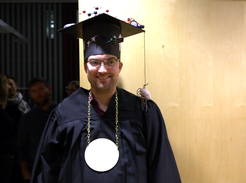Björn-Johannes Harder successfully defends PhD thesis
Research sheds light on how to transform the current petrochemical industry into a more sustainable bio-based chemical industry

After four years of intense research at the IMPRS Magdeburg, our student Börn-Johannes Harder successfully defended his PhD thesis entitled "Implementation of Model-Based Metabolic Engineering Strategies for the Production of Itaconic acid by Escherichia coli".
Harder's work focuses on changing the current petrochemical industry into a more sustainable bio-based chemical industry - one of the main challenges of the 21st century due to limited fossil resources. In principle, so-called (bio-based) platform chemicals can replace petrochemically produced bulk chemicals. The challenge, though, is to optimize the biotechnological processes for the cost-efficient production of these compounds.
His thesis aimed to optimize the production of the potential platform chemical itaconate. Initially, the pathway for the itaconate biosynthesis was introduced into Escherichia coli. However, since the microbial metabolism is optimized for biomass formation, only small amounts of itaconate were synthesized. For the targeted redirection of the intracellular fluxes to the product, an iterative model-based approach allowing the calculation of combinations of gene deletions for growth-coupled synthesis of itaconate was pursued. Within three iterations, a strain ita23 was constructed, which produced itaconate with the desired high yield.
Besides a high yield, a high productivity is required for the industrial production. Both cannot be optimized simultaneously. Therefore, an attractive approach is a so-called two-stage process, decoupling biomass and product formation. In this work, a two-stage process was designed based on the high yield itaconate production strain ita23. For this purpose, a strain with a dynamically regulated TCA-cycle was constructed. Then, a bioreactor process was developed, which showed an increase in productivity by 22% in the two-stage process compared to the one-stage process.
Before joining the Analysis and Redesign of Biological Networks group under the supervision of Dr.-Ing. Steffen Klamt, Harder had previously completed his Master in Biotechnology at the Technical University Brunswick with a focus on Biochemical Engineering.












